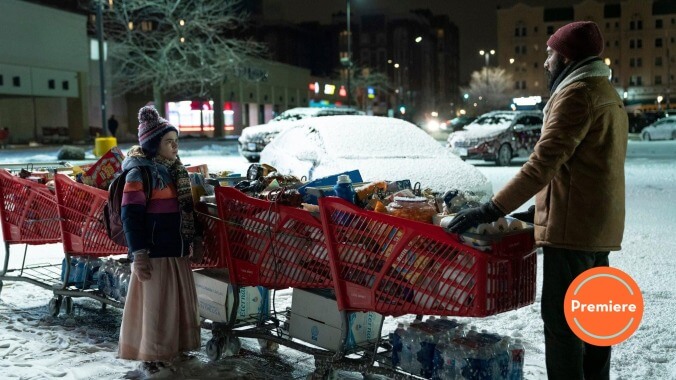Station Eleven’s three-part premiere offers little escapism
Based on Emily St. John Mandel's 2014 novel, Station Eleven echoes our COVID-era reality, but is more reminiscent of a zombie apocalypse movie


Adaptations always have it a bit rough—they’ve got an ur-text to live up to, and have to develop their own merits to stand on their own. Denis Villeneuve’s Dune brewed a singularly strange, sensual atmosphere in order to expand beyond the book. The best Jane Austen adaptations often excise useless characters and liven up the text, as in Ang Lee’s Sense And Sensibility. The more a book (or any source material) is loved, the higher the standards and stakes are for the adaptation. The HBO Max series Station Eleven has an especially difficult task, because not only is it adapting a book, it’s tapping into a real life global story that is still, unfortunately, unfolding.
The first episode, like the novel before it, follows the familiar beats of an apocalypse story (both the show and novel follow the suspenseful beats of a zombie apocalypse, to be more clear), but it’s strange to compare the response to the disaster to our real world experience. (Never before have I felt so grateful for the two weeks that COVID-19 takes to show up.) There are definitely moments that hit too close to home, or feel reminiscent even as they are unfamiliar—the fully stocked but empty grocery store is weird, but the food hoarding is very recognizable.
The show also attempts to establish its own disturbing imagery through scenes of Jeevan (Himesh Patel), Frank (Nabhaan Rizwan), and Kirsten (Matilda Lawler) watching aghast as a plane crashes in front of them, or a sick man stuck inside his car who Jeevan doesn’t want to let out, or—later, in the second episode—Kirsten getting texts about how her parents’ bodies are in the morgue. Station Eleven might actually be a bit triggering depending on what your last two years looked like, but that’s just unavoidable.
The book’s structure, which the TV show attempts to follow, is carefully plotted to go back and forth in time, traverse the world of many characters whose lives are gently intertwined, the way they always are. Unfortunately, Station Eleven stumbles in episodes two and three, which focus on Kirsten and Miranda. Kirsten in particular is a confusing character; in the novel, her traumatic story is just one among many in her community. But the show presents her as a special case, someone who’s particularly wary where others are friendly. This seems ridiculous—are you telling me the people born after the pandemic wouldn’t have more sense to survive the world after this?
It also seems like Kirsten has struggled much more than everyone else, perhaps because she was eight when the pandemic started. I understand that that can be traumatic on its own, but it’s a bit odd. Can she really be the only person with abandonment issues after the pandemic, who can’t tell that guy is creepy? He is so obviously creepy! Also, doesn’t she know the double tap principle?
In the book, Jeevan and Kirsten part ways. In the show, they stay together, which I enjoyed greatly—Matilda Lawler and Himesh Patel have a sweet ease to their interactions, and Lawler in particular, with her strong brows and thoughtful face, is arresting to watch. Which is why it’s so disappointing to have her age up to Mackenzie Davis, who has a much more open face than Lawler. And it’s irritating to see in the second episode, “A Hawk From A Handsaw,” that Jeevan and Frank are treated as Kirsten’s traumatic backstory when we got to spend so much time seeing things from Jeevan’s point of view in the first episode.
Zombie apocalypse story like The Walking Dead and Max Brooks’ World War Z novel have used the jumping between character perspectives with great aplomb. But there’s a difference between changing points of view, which I think the third episode does well, and having a character take over another’s story. (The good news is that Jeevan is meant to show up in 10 episodes.)
Arthur Leander (Gael García Bernal) doesn’t get any interiority in the novels, and the third episode of the premiere, “Hurricane,” treats him similarly—as just a character in his first wife Miranda’s story. Here’s where I noticed a major problem with this adaptation: It filters a lot of the stories of the book, which felt fresh and exciting even as they referenced familiar tropes, through shoddy prestige TV tropes. In the book, Arthur cheats on Miranda with Elizabeth (played in the TV series by Caitlin Fitzgerald) as an almost inevitable consequence of his career taking off, which alienating him from his wife.
But the series implies that Miranda’s workaholic habits are what push Arthur away and into Elizabeth’s arms, which I find tiresome and misogynistic. It robs the moment of its inherent tragedy: Miranda and Arthur grow apart not because anyone didn’t show up in the relationship or made a mistake, but because they grew apart. I also think using the Station Eleven comic book as a wedge between them—Arthur calls the character on the cover “the man who ruined my life”—lessens the poetry of the comic book a bit. Miranda’s fury over someone being in her studio is understandable to many artists; her burning the studio down in response, less so.
Bernal is wonderful but incredibly miscast, and has little chemistry with Danielle Deadwyler. It could also be that their scenes are filmed with a heavy melancholy, which especially hangs over the third episode like a dark cloud. Deadwyler is very fun to watch, but the writing and directing underserve her. She’s not allowed to engage in sparkling banter with Bernal—instead, she’s irritated until he wears her down. Nor does show any emotional response to Jonah Timothy Simons’ dismissive jokes about the apocalypse. Instead, the character is presented as morose and serious no matter the situation. Even her crying at a work meeting is strangely couched in the awkward direction of no one really responding to her outburst.
The characters feel so disconnected from each other, but the whole point of the book was the joy of connection and the realization of how it goes on, even after the world ends. Is the show gearing up to that realization, or will it take a more nihilistic tone? So far, I’m not sure.
Stray Observations
- I understand the artistic choice—we need to see the actors’ faces—but I wish people in the show’s before-times would wear masks. At one point, Tiya Sircar takes off her mask before leaving the children’s rooms.
- Tom’s Independence Day audition speech was a funny moment. How does he remember that?
- Also, is that him at the table with Arthur and Elizabeth in the third episode?!
- I also couldn’t tell who Kirsten woke up next to in the second episode. The composer? The show has so many more bald people than I’m used to in one show. Did you guys figure that out?
- I loved the summer camp feeling the traveling theater has. When I first read the book, I struck me as a serious take on the 30 Rock joke where Jack asks Liz, “In a post-apocalyptic world, how would society even use you?” Seems like “traveling bards” will be very needed.